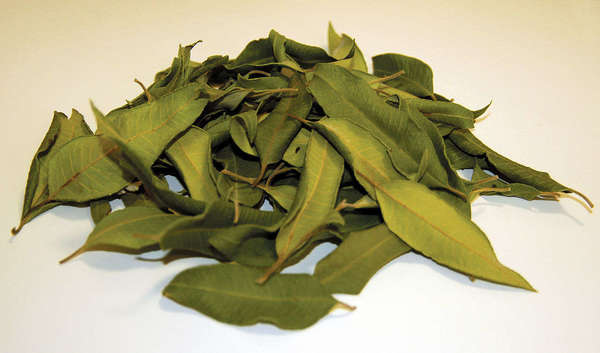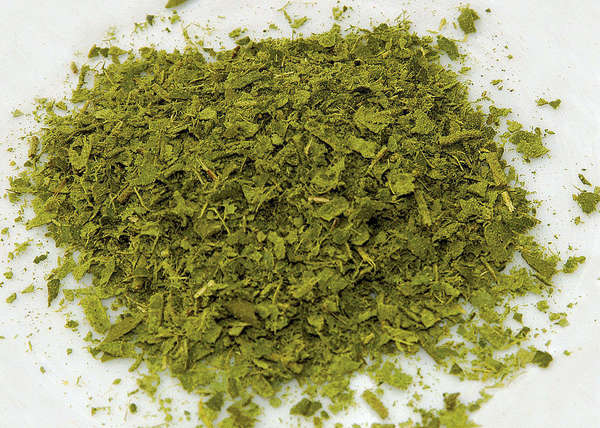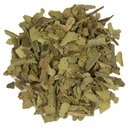Lemon Myrtle
Wikipedia: Backhousia_citriodoraLast Updated: May. 13, 2014
↑About Lemon Myrtle
 Whole-leaf Dried Lemon Myrtle (Backhousia citriodora), Photo © CSIRO (Australia), CC BY 3.0.
Whole-leaf Dried Lemon Myrtle (Backhousia citriodora), Photo © CSIRO (Australia), CC BY 3.0.The aroma of lemon myrtle is similar to other naturally lemon-scented herbs, including lemongrass, lemon balm, and lemon verbena. Although not closely related, these plants all share many chemical components in common. Among these herbs, lemon myrtle contains the highest concentration of citral, a mixture of chemicals responsible for the lemony aroma.
When consumed on its own as an herbal tea, lemon myrtle has an intense lemon fragrance, and a strongly astringent mouthfeel, but like the other lemon-scented herbs, it does not impart the acidity of lemon juice. It can be blended with other, less astringent herbs, to result in a smoother mouthfeel, or blended with full-bodied black teas so that its astringency is less evident.
 Dried and Crushed Lemon Myrtle (Backhousia citriodora) Leaves, Photo © CSIRO (Australia), CC BY 3.0.
Dried and Crushed Lemon Myrtle (Backhousia citriodora) Leaves, Photo © CSIRO (Australia), CC BY 3.0.Health benefits and medicinal uses
The health effects of lemon myrtle are likely similar to those of lemongrass, as it shares the largest active component, citral, which has been studied on its own as an active ingredient. Citral has been shown to induce apoptosis (cell death) in cancer cells in as low a concentration of 44.5 μM, comparable to a cup of tea prepared from 1g of lemongrass.[1] Lemon myrtle tea is likely to have a higher concentration of citral than the infusions prepared from other herbs with lower citral concentrations.The essential oil of lemon myrtle was also found to have significant anti-microbial effects, which were found to be stronger than that of citral alone, and were also found to be more powerful than that of Melaleuca alternifolia, the plant used to make tea tree oil.[2]
References:
1. Nativ Dudai et. al., Citral is a New Inducer of Caspase-3 in Tumor Cell Lines, Planta Med 2005; 71(5): 484-488.
2. Jenny M. Wilkinson et. al., Bioactivity of Backhousia citriodora: Antibacterial and Antifungal Activity, J. Agric. Food Chem., 2003, 51 (1), pp 76–81.
↑Recent Lemon Myrtle Reviews — RSS 
87 / 100

Australian Lemon Myrtle Organic from Upton Tea Imports
Style: Lemon Myrtle – Region: AustraliaFeb. 15th, 2010
The aroma of both the tea and the dried leaf are intensely lemony, much more so than the other lemon herbs I've tried, including lemongrass, lemon balm, and lemon verbena. More like lemongrass than the others, and least like lemon balm. The lemon quality is so overpowering that it's hard to notice other aspects of th...
Read Full Review↑Top Reviewers
| Rank | User | # | % |
| 1 | 1 | 17 |
Review 2 teas to get on this list!
Advertisement
↑Most-Rated Lemon Myrtle

Australian Lemon Myrtle Organic
| Brand: | Upton Tea Imports |
| Style: | Lemon Myrtle |
| Region: | Australia |
| Caffeine: | Caffeine Free |
| Leaf: | Loose |
1 Rating


